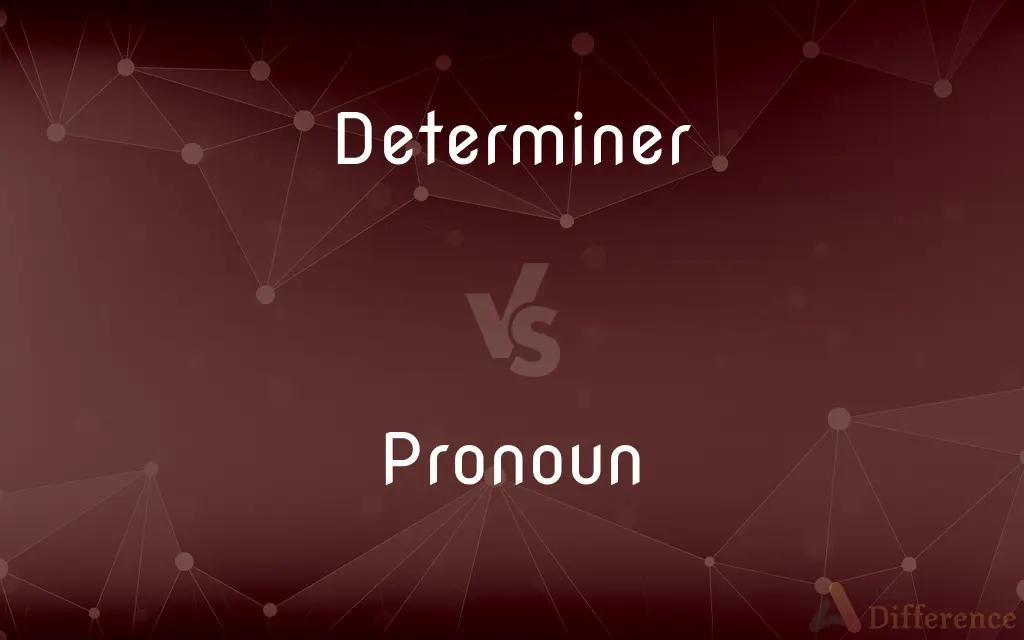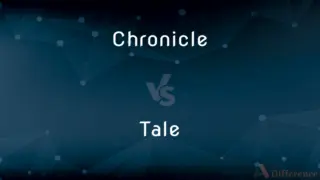Determiner vs. Pronoun — What's the Difference?
Edited by Tayyaba Rehman — By Fiza Rafique — Updated on March 29, 2024
Determiners function to specify and identify nouns, whereas pronouns replace nouns to avoid repetition and maintain fluency.

Difference Between Determiner and Pronoun
Table of Contents
ADVERTISEMENT
Key Differences
Determiners are words that precede nouns to clarify which or what kind of noun is being referred to. They include articles (a, an, the), demonstratives (this, that, these, those), possessives (my, your, his, her), and quantifiers (some, many, few). Determiners are essential for providing context to the noun, indicating specificity, quantity, or possession. On the other hand, pronouns stand in for nouns or noun phrases, allowing for concise and fluid sentences. Pronouns include personal (I, you, he, she), reflexive (myself, yourself), relative (who, which, that), and interrogative (who, what) pronouns, among others.
While determiners are always attached to a noun and modify the noun directly, pronouns replace the noun entirely and can perform various grammatical roles, such as subjects, objects, or possessive markers. This distinction is crucial in sentence structure and meaning. For instance, determiners help to limit or expand the scope of a noun within a sentence, whereas pronouns help to avoid repetition of the noun, making the text more readable.
In terms of usage, determiners are necessary for almost every noun phrase to clarify its reference, except in cases of proper nouns or when nouns are used in a general sense. Pronouns, however, are used based on the need to refer back to a previously mentioned noun or to avoid specifying a noun directly, often for stylistic reasons or to maintain anonymity or generality.
The choice between a determiner and a pronoun can significantly affect the clarity and flow of communication. Determiners provide specific information about the nouns they precede, making sentences precise and informative. Pronouns, by enhancing cohesion and avoiding redundancy, make sentences smoother and easier to follow.
Understanding the differences between determiners and pronouns is key to mastering syntax and semantics in language. Determiners set the stage for the noun, giving necessary information about it, while pronouns keep the narrative going without overloading it with repetitive noun usage.
ADVERTISEMENT
Comparison Chart
Function
Specifies or identifies nouns.
Replaces nouns to avoid repetition.
Examples
A, an, the, this, those, my, few.
I, you, he, she, it, they, which, who.
Role in Sentence
Modify nouns directly, always attached to a noun.
Can act as subject, object, or possessive; not attached to a noun.
Usage
Clarify which or what kind of noun is being referred to.
Refer back to a noun already mentioned or avoid specifying directly.
Contribution to Text
Provide specificity, quantity, or possession information about nouns.
Enhance fluency and readability by reducing repetition.
Compare with Definitions
Determiner
Points out particular items.
These cookies are delicious.
Pronoun
A word that takes the place of a noun to avoid its repetition.
She went to the store and bought some bread.
Determiner
A modifying word that determines the kind of reference a noun or noun group has.
The book on the table is mine.
Pronoun
Represents a person or thing mentioned elsewhere in the discourse.
It is raining outside.
Determiner
Specifies which thing or person is meant.
That idea sounds promising.
Pronoun
Used to ask questions about people or things.
Who is at the door?
Determiner
Shows possession or belonging.
My phone is out of battery.
Pronoun
Refers back to the subject within the same sentence.
The cat licked itself clean.
Determiner
Indicates the quantity of the noun it precedes.
Many people believe in climate change.
Pronoun
Can indicate ownership.
The book is yours.
Determiner
A determiner, also called determinative (abbreviated DET), is a word, phrase, or affix that occurs together with a noun or noun phrase and serves to express the reference of that noun or noun phrase in the context. That is, a determiner may indicate whether the noun is referring to a definite or indefinite element of a class, to a closer or more distant element, to an element belonging to a specified person or thing, to a particular number or quantity, etc.
Pronoun
In linguistics and grammar, a pronoun (abbreviated PRO) is a word that substitutes for a noun or noun phrase. Pronouns have traditionally been regarded as one of the parts of speech, but some modern theorists would not consider them to form a single class, in view of the variety of functions they perform cross-linguistically.
Determiner
One that determines.
Pronoun
A word that can function as a noun phrase used by itself and that refers either to the participants in the discourse (e.g. I, you) or to someone or something mentioned elsewhere in the discourse (e.g. she, it, this).
Determiner
(Grammar) A word belonging to a group of noun modifiers, which includes articles, demonstratives, possessive adjectives, and words such as any, both, or whose, and, in English, occupying the first position in a noun phrase or following another determiner.
Pronoun
The part of speech that substitutes for nouns or noun phrases and designates persons or things asked for, previously specified, or understood from the context.
Determiner
(grammar) A member of a class of words functioning in a noun phrase to identify or distinguish a referent without describing or modifying it.
Definite articles and indefinite articles are types of determiners.
Pronoun
Any of the words within this part of speech, such as he or whom.
Determiner
(grammar) A dependent function in a noun phrase marking the NP as definite or indefinite. This function is usually filled by words in the determinative class but may be filled by other elements such as a genitive pronoun.
Pronoun
(grammar) A type of word that refers anaphorically to a noun or noun phrase, but which cannot ordinarily be preceded by a determiner and rarely takes an attributive adjective.
Determiner
Something (some input factor, a nonsentient agent) that determines, or helps someone to determine, something else.
In quality management, the determiners of quality sometimes differ across use cases.
Pronoun
Any of the pronouns by which a person prefers to be described, typically reflecting gender identity.
My pronouns are she/her.
Determiner
Someone (a sentient agent) who determines; a decider of a disposition.
He is the determiner [usually referring to God (in theological contexts) and job roles (in administrative contexts)]
Who is the determiner? [administratively or theologically]
Pronoun
A word used instead of a noun or name, to avoid the repetition of it. The personal pronouns in English are I, thou or you, he, she, it, we, ye, and they.
Determiner
One who, or that which, determines or decides.
Pronoun
A function word that is used in place of a noun or noun phrase
Determiner
An argument that is conclusive
Determiner
One of a limited class of noun modifiers that determine the referents of noun phrases
Determiner
A determining or causal element or factor;
Education is an important determinant of one's outlook on life
Common Curiosities
Can you give an example of a sentence with both a determiner and a pronoun?
Yes, "My sister said she would help us tomorrow." Here, "My" is a determiner specifying "sister," and "she" is a pronoun referring back to "sister."
Why are determiners important in English?
Determiners are important because they provide necessary information about nouns, making sentences clear and specific by indicating which, what kind, or how many of the noun is meant.
How do pronouns function?
Pronouns replace nouns or noun phrases in sentences, helping to avoid repetition and maintain coherence and focus in communication.
How do pronouns help in maintaining anonymity?
Pronouns like "someone," "anyone," or "they" can be used without specifying a particular person, thus maintaining anonymity or generality.
How do determiners and pronouns contribute to sentence variety?
By using determiners and pronouns effectively, writers can vary sentence structure, making writing more dynamic and engaging while ensuring clarity and coherence.
What's the role of demonstrative determiners in communication?
Demonstrative determiners (this, that, these, those) are crucial for indicating specific items in relation to the speaker and listener, aiding in clear, precise communication.
Can the use of pronouns sometimes cause confusion?
Yes, if it's unclear to which noun a pronoun refers, ambiguity can arise. Clear antecedent reference is crucial for avoiding confusion.
What is the difference between a determiner and an adjective?
A determiner specifies or clarifies noun reference, often indicating quantity, possession, or definiteness, while an adjective describes a noun's qualities or characteristics.
Can a word be both a determiner and a pronoun?
Yes, some words can function as both, depending on their use in a sentence. For example, "that" can be a determiner ("That book is good.") or a pronoun ("I believe that.").
What are determiners?
Determiners are words placed before nouns to specify or clarify their reference in terms of definiteness, quantity, possession, or identity.
Can determiners be omitted in English?
In some cases, such as with proper nouns or in plural general references, determiners can be omitted. However, in most cases, determiners are needed for clarity and specificity.
In what situations are pronouns most useful?
Pronouns are most useful when referring to someone or something previously mentioned or when the identity is known from context, enhancing sentence flow and avoiding redundancy.
How do reflexive pronouns enhance a sentence?
Reflexive pronouns (myself, yourself, etc.) emphasize the subject's action upon itself, adding clarity or emphasis to the sentence.
Are there any exceptions to the use of determiners with nouns?
Yes, certain noun types, like proper nouns or uncountable nouns in a general sense, do not always require determiners.
How does the choice between a determiner and a pronoun affect text readability?
Proper use of determiners and pronouns ensures specificity and coherence, respectively, making the text more readable and comprehensible.
Share Your Discovery

Previous Comparison
Chrysalis vs. Cocoon
Next Comparison
Chronicle vs. TaleAuthor Spotlight
Written by
Fiza RafiqueFiza Rafique is a skilled content writer at AskDifference.com, where she meticulously refines and enhances written pieces. Drawing from her vast editorial expertise, Fiza ensures clarity, accuracy, and precision in every article. Passionate about language, she continually seeks to elevate the quality of content for readers worldwide.
Edited by
Tayyaba RehmanTayyaba Rehman is a distinguished writer, currently serving as a primary contributor to askdifference.com. As a researcher in semantics and etymology, Tayyaba's passion for the complexity of languages and their distinctions has found a perfect home on the platform. Tayyaba delves into the intricacies of language, distinguishing between commonly confused words and phrases, thereby providing clarity for readers worldwide.
















































